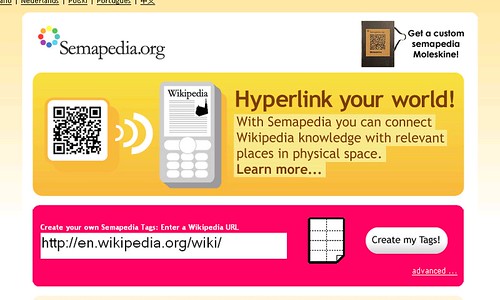The tool is called Semapedia
and it uses this new (in Europe) technology called smartcode which basically allows to encode information in a black and white pixelised structure (think: 2D version of the traditional supermarket barcode), like a web link.
Basically using sites like Semapedia, you can generate these smartcodes that contain an html link for any wikipedia article (like Wall-E, I liked Wall-E). Semapedia will return you with a pdf containing real world tags that you can readily print and glue wherever you find it interesting in your physical vicinity.
Then, the anonymous mobile troller that passes by, may take a snapshot and, if his mobile device has installed a smartcode scanner (I use the neoreader app for the iphone), he can scan the picture and extract the link that will give him instant access to the web page contained in the smartcode. Here's what I got on my first test:
Cute, hu?
This new technology can encode any textual information including links, SMS messages, microformats, you name it. The applications for this are really mind-blowing and it gets my vote as what regards the next disruptive big thing coming ahead! Wait 'till more people get mobile net access to watch those marketeers "smart tag" virtually any product around you! Heck, I want a t-shirt and a fake tattoo with a smartcode for my web-page!
With the iphone I used the free neoreader app. But I found out there are heaps of smartcode scanners available for hundreds of mobile devices out there. So, if you've got mobile web on your phone or pda and you're a tech enthus like I am, you may want to give it a shot at this service ;)
So far, there are several encoding standards that I know of: QR code, datamatrix and shotcode. You can very easily generate a smartcode to your web-site here, here and here. There, you'll find also useful links for smarcode scanners for your mobile device. UPDATE: You'll also find here a heap of interesting news related with 2d codes in Europe. In particular I found there a link to blog4mobile, which turns my blog into a mobile blog AND provides a QR code to it. Anyone knows of other such services?
People have already started tagging the real world, all over, using Semapedia smartcodes :) Is this the birth of a new socio-cultural movement?
How about you? Have you tried it yet? What smarcode generators/scanners do you use?



